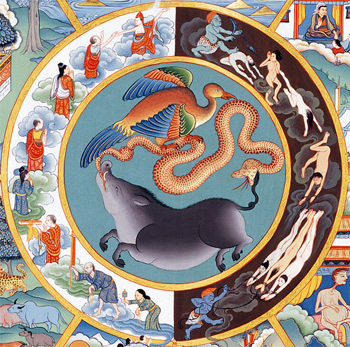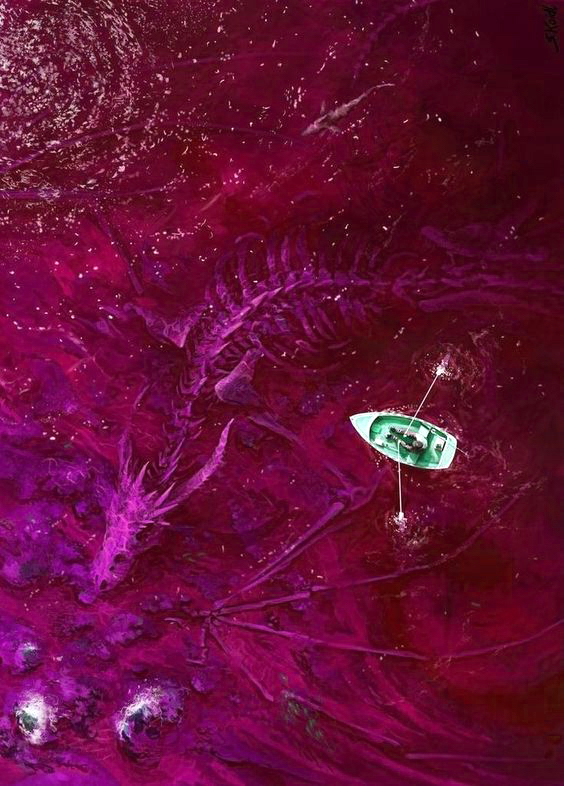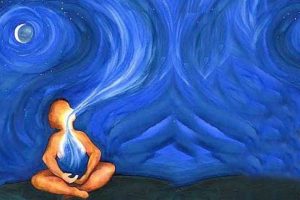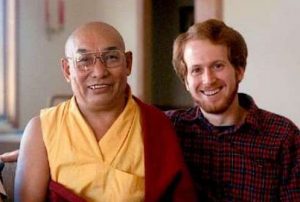
In the vast garden of Vajrayana Buddhism, with its riotous profusion of fragrances and textures, its fantastic hues of greens, golds, and reds, one flower stands out. The shimmering foliage seems to branch endlessly, expressing itself now as diaphanous petals, now as thorny stems, now as plump and luscious fruits. This unique plant is both medicinal and spiritual. It’s name is Chöd—the path of cutting through. And when the garden of our lives is overrun by the choking weeds of viral pestilence and viral hatred, there is no better antidote. From its beginning, and by its very nature, Chöd is a mind-body healing practice. Yes, it thrusts one toward the ultimate goal of full realization, toward a luminous and liberated form of being. But along the way, it enlists practices that directly confront the challenges of illness, karma, and life obstacles, both inside and outside one’s personal shell. Every one of hundreds of brief and extensive Chöd practices can be used for healing. But there are specialized practices as well.
The epitome of the Chöd of MaChik Labdrön (the female Tibetan saint who developed the practice) is contained in the collection called the Precious Rosary of Chöd. Of the 22 extensive rituals, fully six are dedicated exclusively to healing others—though they benefit oneself equally. Chöd is also unique among spiritual practices because, while it may be practiced in solitary retreat, it is also taken out into the world, wandering through verdant valleys, boulder-strewn hills, and urban landscapes. Directed toward a damaged environment, natural disasters, climatic disturbances—and social upheaval—it intends to neutralize whatever negative forces are encountered. In this way Chöd cuts through both our inner turmoil and outer disharmonies in one stroke.
Offering above and below
The principles of Chöd are simple. Yet the practice can weave intricate and elaborate nets of sacred music, mystical poetry, and luminous visualization. In essence though, it is a method of fearless generosity, of seeing beyond appearances into the brilliant matrix from which appearances arise—and at the same time acting with ultimate compassion and integrity within the manifest world. The Chöd-cutting process sees one leaving this karmic body and taking on the identity of the sacred feminine. This is the wisdom form, energy, and awareness of the wrathful, dancing red Vajravarahi. One’s corpse is then cooked up within one’s former skull cup, sanctified and transformed into an ocean of effulgent nectar. A stew of primary five-elemental potential, it is capable of being transformed into infinite clouds of offerings—of every conceivable object, sensory experience, or state.
Everything exquisite and wondrous is mind-generated during the White Feast for an offering befitting the Higher Guests, the enlightened buddhas, bodhisattvas, dakinis, protectors, and spiritual masters. The nectar also provides an infinite healing balm to soothe the suffering of the Guests of Compassion within the six states of beings: hell realms, hungry ghost, animal, human, demi-god, and god realms. Whether one sees this as a symbolic representation of our own psyche, or as actual dimensions of existence, the intention is to relieve the pain, deficiency, attachment, greed, and egotism that entraps beings.
This is a good start, but now we need to focus on that crucial category, the Lower Guests. Here, within the wrathful Red Feast, we must feed the demons. These invitees to our feast of compassion do not crave nectar, but rather the corpse itself, amplified and prepared in a variety of graphic and gruesome ways. For our pernicious, intractable, and inexorable obstacles, including ongoing illness, pestilence and all our familiar sufferings of mind and body, the offering must match their nature, their intensity, and their ferocity.

Dealing with demons
Demons are at once psychological, symbolic, karmic, and actual. And in Chöd we are tasked with holding these different paradigms, these very different realities, in our mind at the same time.
1. Psychological. Ill-will, jealousy, confusion, dogmatism, fixations, and thousands of cultural narratives and fabricated beliefs are destructive creatures that take us far away from our better self. These inner demons come for us on a daily basis. We can’t run from them, but we can give away the very thing that invites them. And so it is explained again and again in Chöd commentaries that flesh itself is desire, blood is the nature of aversion, and bone is ignorance—the three mental poisons of classic Buddhism through which we cycle endlessly.
2. Symbolic. Anything and everything can be an allegorical demon. Stupidity, old age, poverty, injustice, pestilence, death itself, all can take the form of horrific spooks that wish to snatch away all we possess, including our lives. Those archetypal fears take the form of demons of place, demons of sickness, demons of body, and demons of mind. But as MaChik stated: “When a thief comes to steal from you, if you have already given everything away, there is nothing left to take.” It is our attachment to outcomes, our hopes and fears, and the narrative of who “I” am that transfixes us and binds us to the wheel of suffering.
3. Karmic. Demons are the return of the ghosts of our own karmic experience. This is about payback, retribution, but also about bad habits. In the past we took life, engaged in slander, theft, ill will, and deception. Now we take full responsibility for our state, our life. We give back mind-generated nourishment, health, wealth, and happiness. If we stopped someone else’s breath, we offer our own dismembered lungs, sinuses, heart. If we destroyed someone else’s peace, now we offer satisfaction, fulfillment, even joy. And karma is not just what we did, but what was done to us. We become habituated and repeat old scenarios, now playing victim, now being perpetrator. Narratives and identity roles entrap and shackle our true nature. All these return to haunt us until we clear them from our book of accounts.
4. Actual. Lastly, from the shamanic or mystic perspective, demons are actual non-human entities that dwell in parallel dimensions, just beyond our perception, like a virus or a gamma ray. Only 5 per cent of our observable material universe can be accounted for by science, while dark matter and dark energy, invisible and incomprehensible, make up the other 95 per cent. Moving beyond the myopia of the modern religion of science, “there are more things in heaven and earth, Horatio, than are dreamt of in your philosophy,” as Hamlet admonished. In spite of a lifetime of denial of our innate ability to perceive the sea of forces in which we are immersed, these sensitivities can be re-awakened. Then we find ourselves in a re-enchanted world of energies and vibrancy, well populated with non-human entities. Some of these forces are neutral, some are very beneficial, and some are highly toxic.
This is the stuff of Chöd which, if practiced, will bring one face to face with all these forms of demon, from psychological symbol to real-life beings who, like viruses and bacteria, may seek a parasitic or even destructive relationship with a human host.
The demon of illness
Ultra-microscopic blobs of DNA or RNA exist as uncounted millions of viral species within the realm of the virome. They defy the categories of living things, yet they act with intent. The questions of what life is, and what consciousness is, will always be far beyond the grasp of objective, outer science. You cannot find an outer answer to an inner problem. But the living matrix of consciousness, luminosity, and the core meaning of life have been experienced by shamans, yogins, kapalikas, tantrikas, sifus, lamas, gnostics, mystics, and advanced spiritual men and women throughout the ages. Every mature culture has also recognized that contagion is a force, an entity, a consciousness. And the viral bits that the technology of materialistic scientism can detect are simply its material traces, its cellular debris. Use all the natural and conventional medicines you can, and use them intelligently. But we ignore the energetic and spiritual basis of disease at great peril.

The great black-red dragon of the East
When the pandemic of 2020 swept in, a sinuous red-black dragon of steel and fire descended like an iron shroud. Waking from its slumber in Eastern lands, its nature is all fire element; its essence is the heat of hatred; in its wake is fear and confusion, deception and chaos; its goal is none other than the taking of life, the taking of liberty, and the smothering of self-awareness. The sleeping beast was awoken by festering anger in the heart of humanity. The fever of intolerance, divisiveness, and self-righteousness fed the flames. But the ultimate nature of our vulnerability to demonic forces is always the same. Not looking at our own mind, we are led by grasping and aversion, inflating the false self and not seeing oneself through the eyes of another.
To placate the demon, we offer the body; we offer all our hopes and fears; we let go of doubts, confusions, and enmeshments. Yet this is neither nihilism nor annihilation, but a re-arisal into our true nature, a re-identification with something elevated, something magical. Beneath the mask of human frailty, the luminous, joyful, and compassionate state is not dependent on events, or the changing stories around us. Its cultivation requires great courage, responsibility, openness, curiosity, and a full heart that kicks out notions of enmity toward sentient beings, toward oneself, or toward embodiment itself.
Let our practice begin by offering physical and spiritual sickness to the waiting demons. With climatic catastrophes waiting in the wings, pollution that threatens extinction, endless wars and hostility, and pandemic annihilation, the only thing that can save us is inner work. No legislation, no political or even economic shifts will by themselves resolve the suffering of humanity and our besieged planet. Compassion, alignment with the forces of illumination, mantra recitation, creating inner luminosity, absorbing negativity into the open dimension, this is the real work of Vajrayana. All else is smoke and mirrors. Demons will be solidified and so will the inflation born of self-doubt and other-hatred. Chöd invites the demons to a redemptive feast in which we are healed and our demons, inner and outer, are quelled.
Like undulating waves of karma and connection, there are moments and pockets of peace and war, security and chaos. But phenomena roll on. Conflict is in the nature of samsara, as is never-ending suffering. The Chödpa is at once both a Vajrayanist and a shaman, working for self-liberation and to heal the landscape, the people, sentient beings. Demonic forces are to be cut through with wrathful compassion, fearless generosity, seeing through the illusions of material form and awakening to the luminous matrix of being. By dissolving those phenomena back into the original purity of their five-elemental ground, they can be truly pacified.
See more














